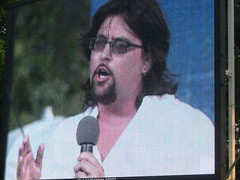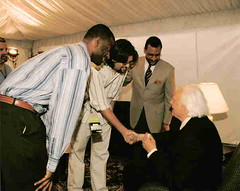Response to MK re. ANKOC
Note to anyone not named Matt Kruse or Bob Campbell: Feel free to eavesdrop on our conversation about Brian McLaren's A New Kind of Christian and comment.
Me: You said a mouthful for an initial salvo. Can't wait for the sequel.MK: J, here's my initial salvo on the book. [Caveats.]
Me: I agree completely on both counts. Regarding your dislikes, I share them as well, in principal. But I didn't interpret the book in quite the same way. I'll respond to each in kind.MK: What I liked:
1) The idea that we are called to redeem the culture we live in, not isolate ourselves from it into a Christian sub-culture. (Amen, Brian.) 2) The idea that modernity does not equal Christianity, and that we need to be careful not to force God into our modern boxes. (This is true and hugely important for reaching a post-modern culture with the Gospel. Simple example... hitting someone with the 4 spiritual laws and a yes or no proposition on Jesus may have worked a generation ago, but it isn't working in this one. Church after church has died because they did church in modern ways rather than in missional ones.)
MK: Things I didn't like:
1) The m.o. of setting up generalized strawmen to the knock down.
Me: I agree that attacking strawmen is an intellectually dishonest form of debate. But off hand, I don't recall where McLaren simply set up strawmen that don't exist. Can you refer me to an example of one that was problematic for you?
MK: (Can you imagine someone saying Jeremy Del Rio and Benny Hinn are Christians... Benny Hinn is a heretical nutjob I wouldn't trust with my lunch money, so Jeremy must be too? Not fair.
Me: Not fair at all!
MK: McLaren clearly has had some bad church experiences, but the blame goes on those churches and not on all churches.
Me: I'm feeling you on this. It's not fair to over-generalize based on unique circumstances. But certain themes have played themselves out over and over again for decades across denominational lines as modern paradigms have been challenges by new ones. Take for example the issue of music styles in worship. There are still old-school evangelicals who believe any music that deviates from classic hymns is inherently evil. No way God can be in gospel or rock or, heaven forbid, hip hop. To acknowledge that this mode of thinking still exists in some contexts is not blaming all churches everywhere, nor is it creating a strawman. I've seen it and experienced it, and mentalities worse than it, in my own life and ministry experience.
MK: The title of the book for example... what does Different mean? If being 'different' means different than the Oral Roberts crew, than amen. If different means different than 2000 years worth of believers, no thanks. What I mean is, he seems to be rebelling against a flawed picture of the Christian faith, an easy one to find fault with.)Me: Regarding the title, I think his reference to a new kind of Christian implies the same kind of meaning that Jesus used in his illustration about "new wineskins." He's not saying that Christ's eternal character or expectations for us should change just because cultures or individuals demand it, but rather that our forms of expressing his timeless Truths must be contextualized.
Me: Context certainly matters in the ANKOC framework, on many levels, but I don't think McLaren would argue that the meaning of Scripture can bend to fit contextual whims. I think what he means is, first, that understanding the context of the times in which the passages were written offers a deeper level of meaning to the texts themselves. For example, Jesus proclaiming the "Kingdom of Heaven" during Roman occupation of Israel gives that phrase a very loaded meaning that Americans struggle to understand from the vantage point of living in a 21st century political democracy.MK: 2) The idea that the text of Scripture is always defined by context. (Here he begins to tread onto some scary ground with the idea that there is no meaning in the text but that which we bring to it. If everything in the Bible is up for grabs and can mean different things at different times for different people depending on their context, then we are putting ourselves above the Scriptures rather than forcing ourselves to sit under the text. Clearly exegesis and hermeneutics are challenging endeavors, but we must hold fast to the belief that God has spoken in universal and eternal ways in the Scriptures. You pull that rug out and you've got nothing to stand on... you just make it up as you go based on your context, i.e. the idea that somehow at this point in Christian history homosexual intercourse is an acceptable moral activity... "I know God condemns homosexual activity from beginning to end of the Bible, but the Bible stopped being written 2000 years ago... if it was still being written, God would be inspiring people to condone homosexuality because our context has changed and God is love and God understands." Dangerous ground Brian.)
Second, understanding the temporal context in which timeless Scripture must be applied in the real world requires us to differentiate between methods and message, Truth and tradition. Your example of the four spiritual laws, for instance. Those were groundbreaking, once, when they were written in the 1950s by a modern man for modern people. Now, some would argue they're practically written in a foreign language. Or the example of the Billy Graham phenomenon. God anointed him, no doubt, but he also appointed him "for a time such as this," and his methodologies and personality were perfectly suited to reach post-war Boomers. It's going to be interesting to watch how BG's ministry adapts in his absense. It's also fascinating that no "Crusade"-style evangelist in the last 25+ years has even remotely scratched the surface of BG's success here in the Western world.
Third, I think he argues that we shouldn't pick and choose scriptures to hold onto based on our contexts. It's easy for example, to compile a three point sermon that speaks to specific sensibilities by skipping verses that don't make sense and only citing those that fit neatly into our theology. On the contrary, he challenges us to wrestle with the hard passages, the ones that contradict our expectations. For instance:
The parts of the Bible that bother you most are the ones that have the most to teach you. ... Instead of minimizing your discomfort trying to explain those parts away, you should bear down on those passages and maximize how different they are, really wrestle with [them]. (ANKOC, p.79
Fourth, he resists the modern approach of removing particular verses from their respective passages to create cliche Christianity. For instance, his comments on degrading the phrase "born again" by divorcing it from its context.
MK: 3) The pooh poohing of individual sin in favor of corporate sin. (For example, the kid who stole the woman's wallet is only partially guilty. She is at fault for having her wallet stolen because she didn't give to the YMCA or vote Democrat. In fact, she is the bigger sinner because she was privileged and should have known better. So let's fix the system but not the individual. Now individual sinners are off the hook.)Me: Where does McLaren pooh pooh individual sin? He clearly differentiates between Sin and Pharisaical "sins" such as snobbishly prejudging social drinking, for instance. (When I grew up, not drinking a beer was the equivalent of the eleventh commandment. While I still don't drink beer, it's not because traditionalists tell me not to.) Having said that, I agree that he emphasizes the problem of systemic, or corporate, sin, but I don't think he suggests that the two problems are mutually exclusive. Individual sin is bad, but so is corporate sin, and God will judge both. America's me-first culture built on the ideals of so-called "rugged individualists" has trouble conceptualizing corporate sin, but the Bible speaks to it repeatedly. The entire Old Testament is comprised of nations, cities, tribes being judged corporately for communal sin, because social structures reflect the hearts of the individuals who create them. Flawed people create flawed stuctures, which in turn perpetuate and in some cases exacerbate flaws in individuals. McLaren suggests that modern American Christianity has been infected by American individualism to the point where it seems, at times, incapable of accepting collective responsibility for flawed systems. (It's getting late -- I'm not sure if that makes sense the way I wrote it.)
Me: I'm not sure he's diminishing the importance of preaching as much as restoring it to some level of balance within the community of believers. The book's central character was very preachy, in fact. Perhaps I'm imposing too much of my own thoughts into my interpretation of the book, but the kind of balance I imagine is modeled in Acts 2. That church was birthed out of Peter's preaching of the Gospel, but it also reflected a perspective of community that is radical by today's modern notions:MK: 4) The idea that preaching is less and less important in the life of the church. (God has ordained the preached Word as a means by which faith comes into the hearts of men and women. The day that we stop preaching Jesus because it doesn't 'connect' with the culture is the day that we set off on our own and leave God's Spirit behind. We need more preaching, not less.)
They devoted themselves to the apostles' teaching and to the fellowship, to the breaking of bread and to prayer. Everyone was filled with awe, and many wonders and miraculous signs were done by the apostles. All the believers were together and had everything in common. Selling their possessions and goods, they gave to anyone as he had need. Every day they continued to meet together in the temple courts. They broke bread in their homes and ate together with glad and sincere hearts, praising God and enjoying the favor of all the people. And the Lord added to their number daily those who were being saved. (Acts 2:42-47)Within this framework preaching and teaching are clearly vital cogs in the wheel, but so is fellowship, communal living (the the point, almost, of communistic living if one interprets the verses literally), food, prayer, praise, and meeting felt needs. My interpretation of McLaren's new Christian -- and if not his, certainly mine -- is one who lives the Word, not just preaches it. One who, like Christ, incarnates it -- "The word became flesh and dwelt among us" -- as he seeks to serve the needs of others. (John 1)
MK: I am blanking out on what else. Maybe if we get into details it'll come back to me. I am down with the church doing church in ways that the culture gets, but I am not down with softening the Gospel. This is the tough line that emerging churches walk.
Me: My buddy Rudy has been part of the emerging church conversation for some time. One of his friends, Andrew Jones, wrote an open letter to an EC critic that addresses some of the concerns about whether ECs soften the Gospel. Frankly, I'm so new to the discussion I'm still figuring that one out. But Jones has been part of the conversation for years and has far greater insight into the challenges.













2 Comments:
Sorry, I've been TOTALLY out of touch with anything related to blogging lately. I'd give you the run of excuses, but the fact is that I've barely been online lately!
No sweat. Welcome back?
Post a Comment
<< Home